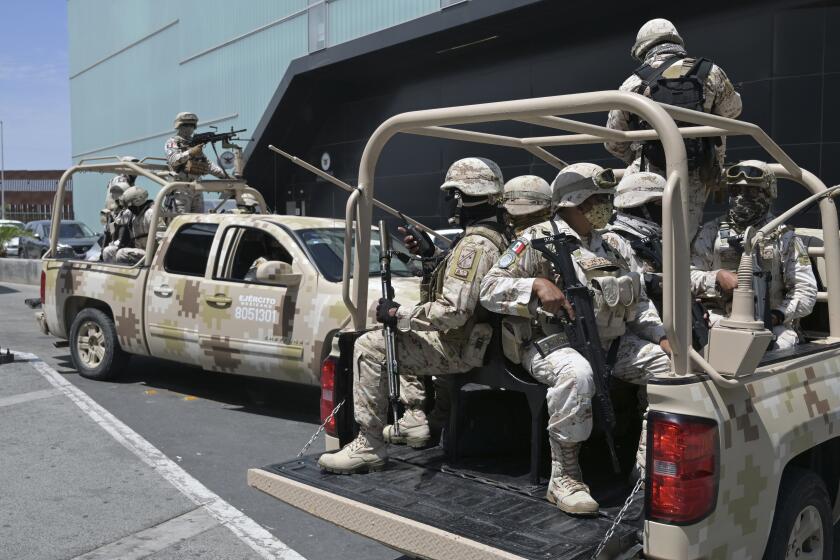Troops patrol Tijuana as city emerges from cartel-fueled night of terror
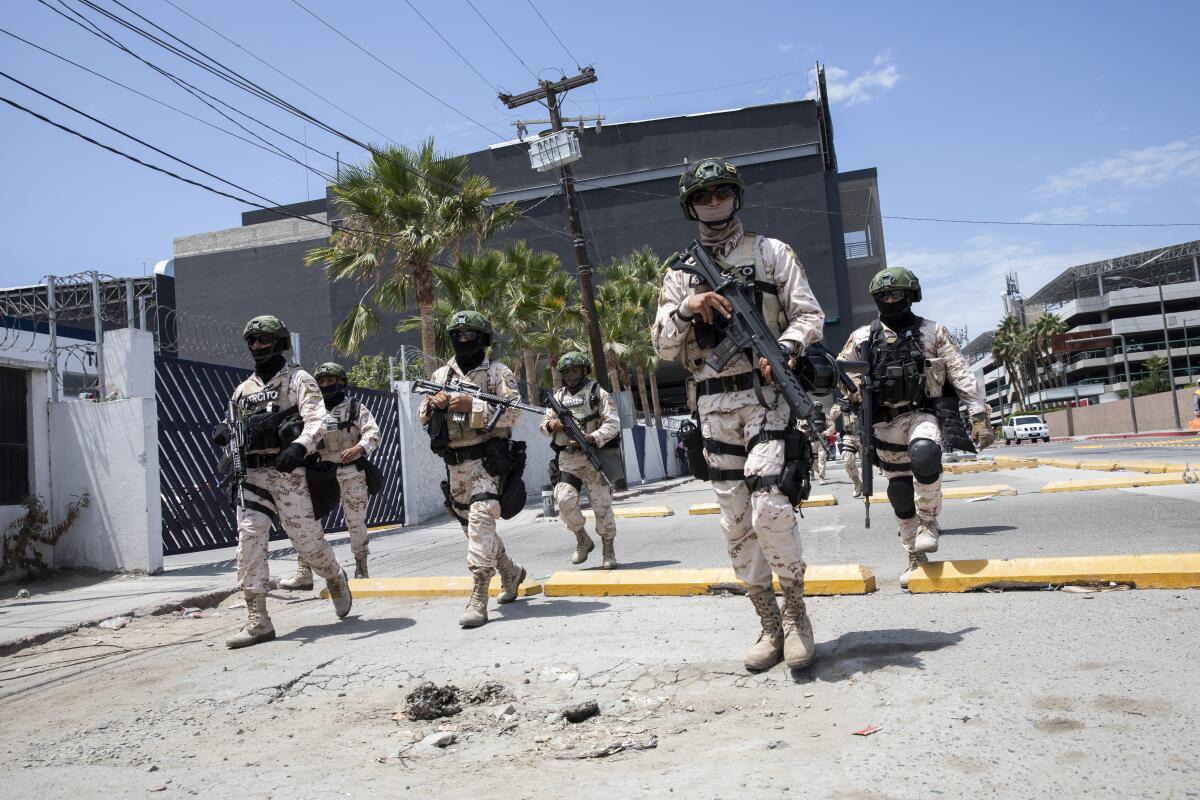
- Share via
TIJUANA — Thousands of National Guard soldiers patrolled the streets of Tijuana on Saturday after armed and hooded criminals effectively shut down the city the night before by forcing passengers off public transportation across the state and setting taxis ablaze.
At least 24 vehicles were charred across Baja California, including 15 in Tijuana. Some were public transportation vehicles while others were privately owned, local authorities said. In some cases, the burned vehicles were left to block roads. Vehicle fires were also reported in Mexicali, Rosarito Beach, Tecate and Ensenada.
Meanwhile, messages began circulating on social media, purportedly from the Cártel Jalisco Nueva Generación, declaring that it was implementing a curfew in Tijuana. The posts told residents that they should go home or risk being attacked.
The U.S. Consul General in Tijuana advised Americans to seek shelter and to avoid traveling to the city. Many people shuttered their business or left the Xolos soccer game early Friday night. There were no reports of injuries.
The fiery demonstrations in Baja California mirrored similar bouts of violence and mayhem in Jalisco and Guanajuato earlier this week, stunning residents across the country and crystalizing the ability of criminal organizations in Mexico to unleash violence, shatter normalcy and shut down cities without hesitation.
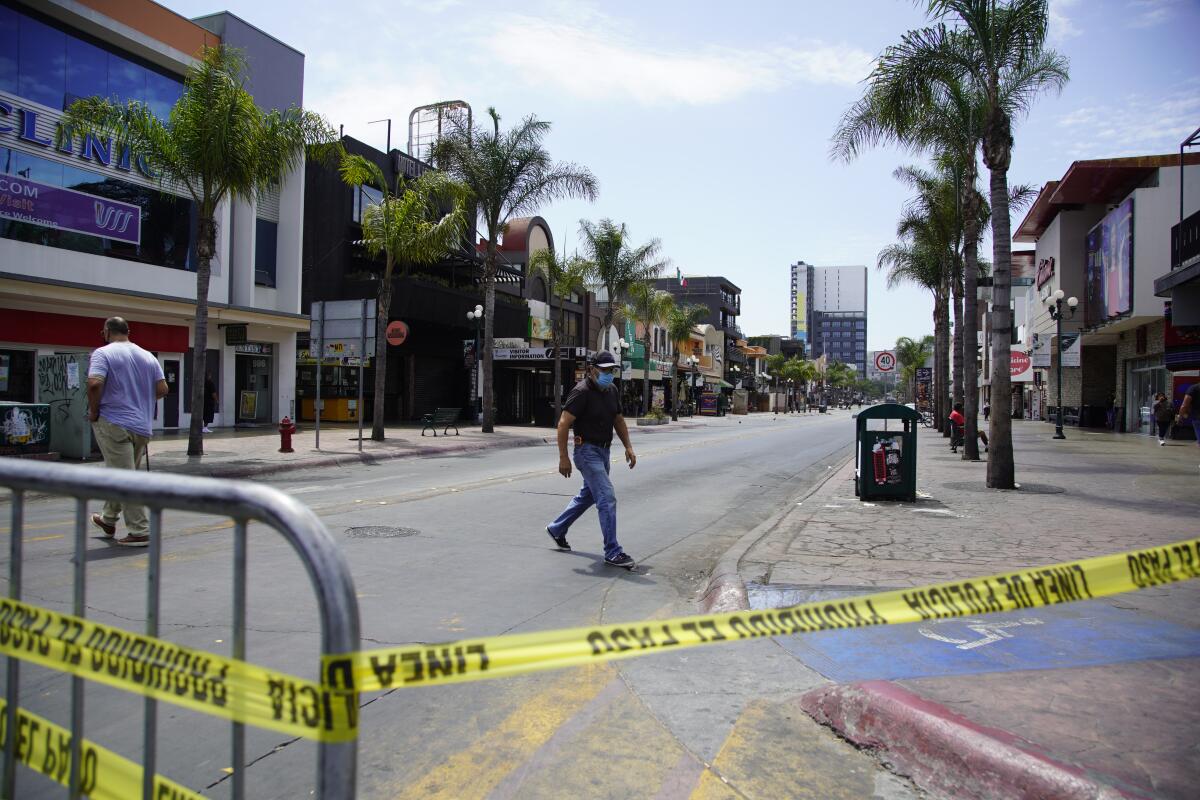
Early Saturday morning, the streets of Tijuana appeared nearly empty, while several groups of late-night workers were left stranded and without public transportation.
“This morning we continue to work on the task of restoring peace in our state,” said Baja California Gov. Marina del Pilar Ávila Olmeda in a taped statement released online. “I fully understand the uncertainty that caused last night’s violent events. I am also aware of the discomfort it causes in the daily activities [of citizens]. That’s why we’re working to get back to normal.”
Baja California struggled Sunday to return to normality after cartel violence shut down much of the region Friday.
Following an emergency security meeting Saturday, Tijuana Mayor Montserrat Caballero Ramírez confirmed that the citywide chaos was caused by members of the Cártel Jalisco Nueva Generación, or CJNG. She cited the Baja California attorney general who she said confirmed the information during the security meeting.
“I am simply called to tell the population that, in Tijuana, we are prepared,” Caballero Ramírez said outside the military base in central Tijuana. “We are prepared to protect [the citizens]. And also to protect them in a calm way, not in a chaotic way.”
Between Friday night and Saturday afternoon, 17 people suspected in the violence in Tijuana, Mexicali, Ensenada and Rosarito Beach had been arrested, Mexican federal authorities said. Some of them were transferred to an airplane bound for Mexico City to be interviewed by federal investigators, a spokeswoman for the Army said.
Bars along the city’s main tourist thoroughfare said they would be closed early Saturday night. Other restaurants in Baja California will also be operating at limited hours according to Canirac, a restaurant industry association.
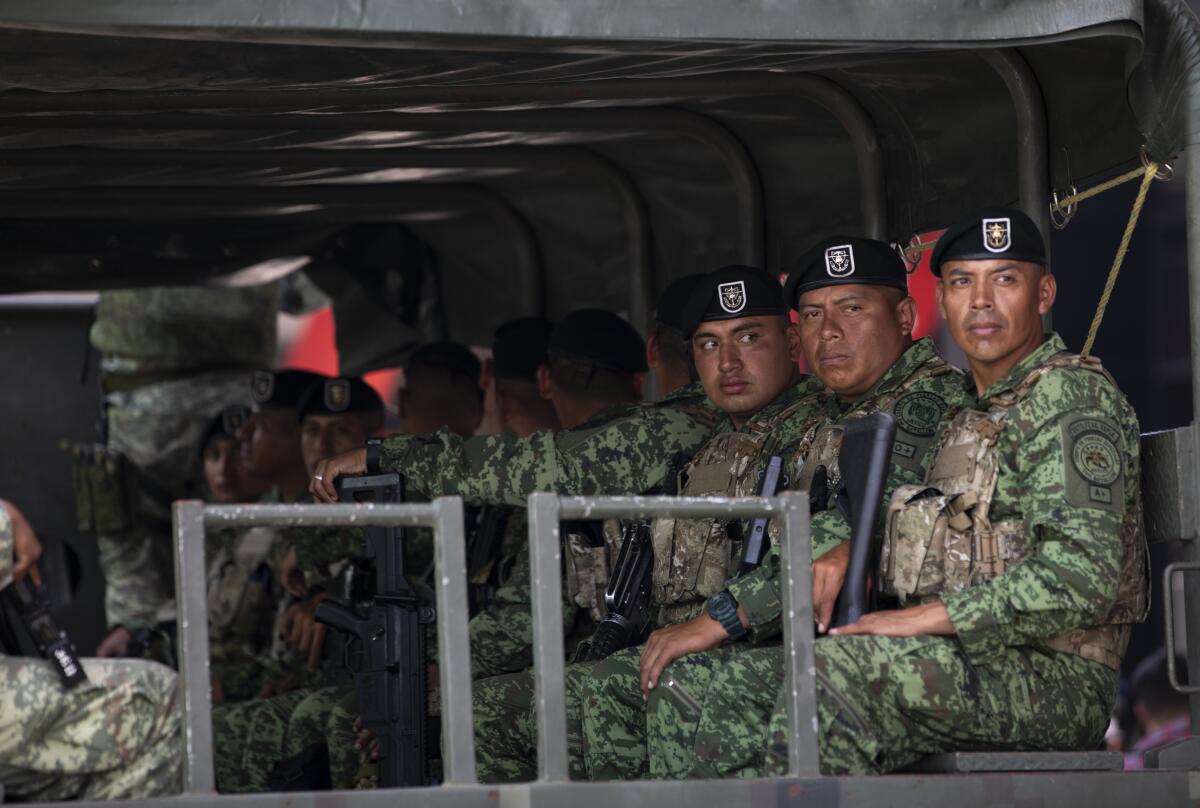
Hundreds of military troops and special forces were called in to assist, arriving at Tijuana’s airport Saturday afternoon to reinforce security across the state. An additional 300 Army troops and another 50 members of the National Guard came off a plane armed and in uniform. Those troops were in addition to 3,000 members of the National Guard and 2,000 members of Tijuana police already patrolling the city, according to Caballero Ramírez.
Events similar to those seen in Tijuana on Friday played out across Mexico last week. Cartel members went on a shooting rampage in Ciudad Juarez on Thursday — killing nine people, including four employees of a radio station — after a fight between rival groups at a local prison, which left two inmates dead. On Tuesday, drug cartel henchmen burned vehicles and businesses in the western states of Jalisco and Guanajuato in response to an attempt to arrest a high-ranking member of the CJNG cartel.
David Shirk, a University of San Diego professor who follows organized crime in Mexico, said while the city had not seen vehicles burned at this scale before, public displays of violence intended to provoke fear and send a message are nothing new.
Cartels and criminal groups in Mexico frequently hijack vehicles or roadways, burning them to distract police or prevent law enforcement from pursuing gunmen. Friday night’s fiery demonstrations also appeared aimed at public messaging — showcasing just how far and wide a coordinated attack could reach, experts said.
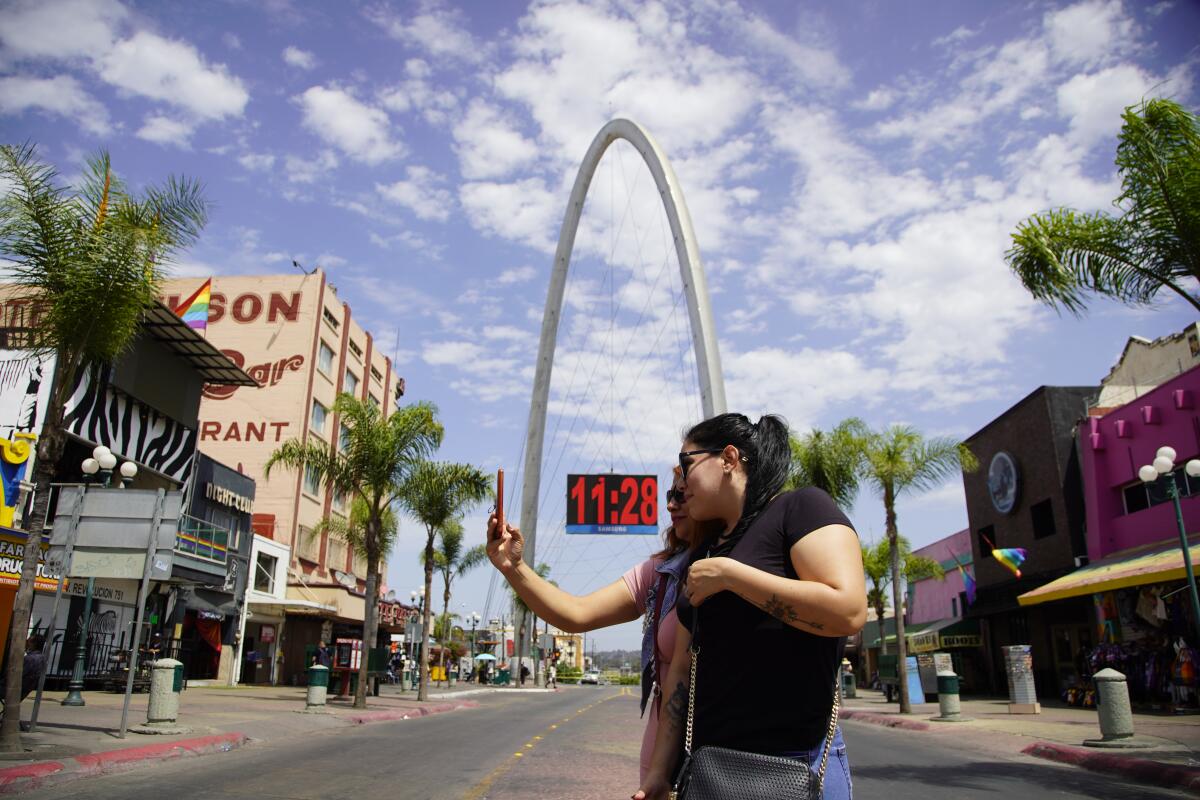
Around midday Saturday, taxi drivers cautiously made their way back outdoors and onto the streets, many frustrated and scared but feeling obligated to return to work.
“We’re definitely fearful about what happened and the possibility of losing a vehicle, having it burned, but we also feel that public transportation is a responsibility that we have,” explained José Rodríguez, a taxi driver in Tijuana’s Zona Norte. He added that it seemed like the criminal groups weren’t looking to hurt anyone, but rather trying to make a statement or issue a warning.
Rodríguez noted an increased presence of police and government security forces in Zona Norte, a tourist zone of the bustling border city of about 2 million. Meanwhile, some tourists from Guadalajara took advantage of empty streets on Avenida Revolución to snap photos in front of Tijuana’s iconic arc. They noted the violence seems normal to them, and not as dramatic or deadly as they are used to seeing in central Mexico.
“We’ll just take our precautions, but in Guadalajara there’s been years of this type of violence happening and what we see here is not as dramatic,” one of the tourists said.
In front of the Cecut, or cultural center in Tijuana, a confused American tourist wondered whether it was safe to take out his camera and take pictures. The cultural center announced it would be closed Saturday in light of the violent events Friday.
Still others worked to recoup their lost wages during the unofficial lockdown.
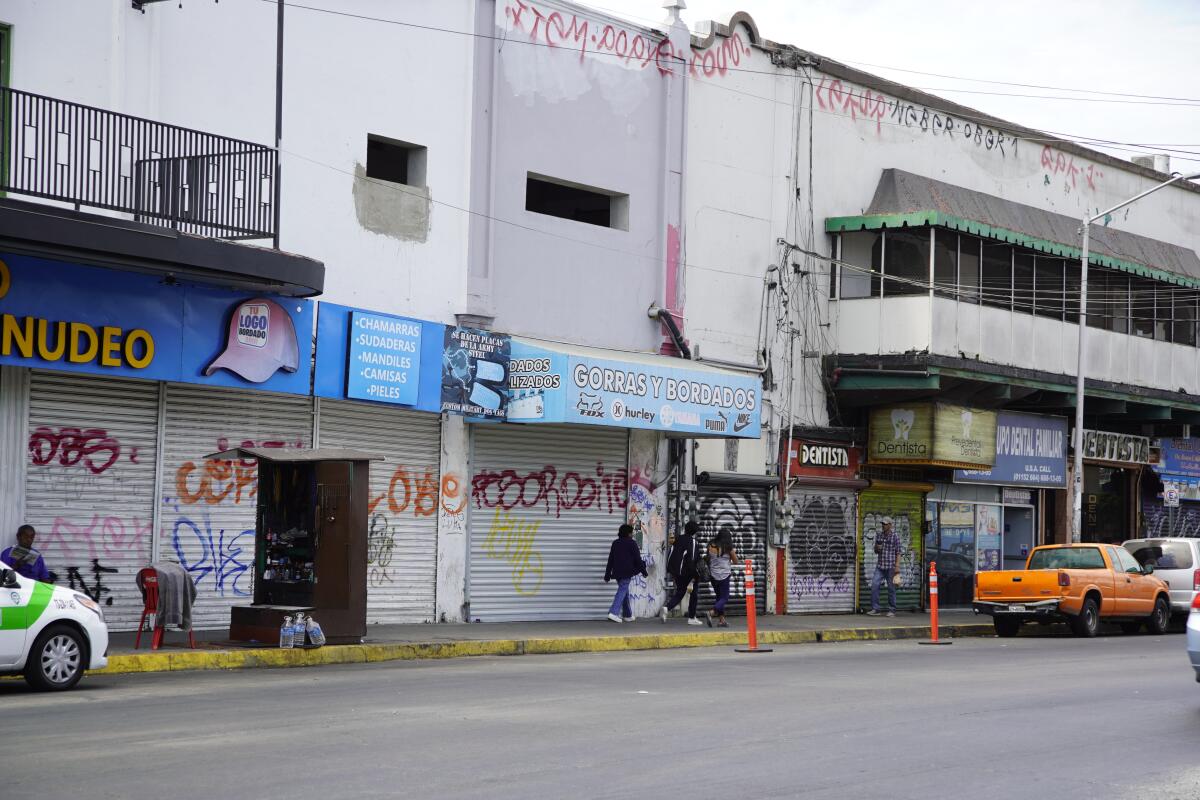
“Today, I’m working out of necessity. Yesterday, I couldn’t work because everything was shut down, but today things seem normal and calm,” said another private taxi driver, Guillermo Estrada.
“Get these bad guys off the streets. It seems like the government is afraid of them. Like they are cowards. Abrazos no balazos doesn’t work,” added Estrada, referring to Mexican President Andrés Manuel López Obrador’s much-criticized security strategy of “hugs not bullets.” The president proposed a form of amnesty for thugs, often reminding journalists and the public that “you can’t fight fire with fire.”
Mayor Caballero Ramírez also received some criticism following her response to Friday’s violence.
In a video published on social media that night, she attributed the events to organized crime and asked citizens to remain calm. She then added that Tijuanense citizens should not have to “pay the consequences of people who didn’t pay their bills,” which many took to mean those who do not pay extortion fees to cartels.
“She basically admits that there are fair targets and unfair targets,” said Shirk, who said the message was surprising for its frankness. “She seems to acknowledge that there is space in Baja California for people to engage in pay back, as long as they fight each other and leave ordinary citizens alone; she’s apparently fine with that.”
Shirk said these sorts of events and others like them underscore the notion that, in many ways, organized crime calls the shots when it comes to security in Baja California.
“The authorities are not able to establish order, and they’re not able to hold people to account,” he said.
Although no one was injured Friday night, Shirk said the violence further erodes the public’s trust in the government and other systems that are supposed to be protecting them and combatting organized crime.
“It threatens anyone who attempts to stand up against organized crime and their influence,” he said.
Officials said surveillance at the entrances and exits of Ensenada will be reinforced through the weekend as Friday’s crimes are investigated.
San Diego Union-Tribune photojournalists Alejandro Tamayo and Ana Ramirez and writers Kate Morrissey and Lyndsay Winkley contributed to this report.
More to Read
Sign up for Essential California
The most important California stories and recommendations in your inbox every morning.
You may occasionally receive promotional content from the Los Angeles Times.
